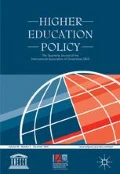Abstract
This article discusses the meanings of quality in the Humboldtian university ideal and in the Bologna process, especially related to issues of institutional autonomy, academic freedom and the integration of teaching and research. The article gives an overview of current practices associated with quality and quality assurance in Germany and Norway. Although differences can be found in how the concept of quality is interpreted in the two countries, it is suggested that there are several possible links to be found between the ideas underpinning Humboldt and Bologna.
Similar content being viewed by others
Notes
What can be interpreted as singular arrangement should be understood on the grounds that universities were to train loyal citizens to the state, who eventually would fill the ranks of government (bureaucracy), army and industry. Hence, the students recruited in these arrangements were already loyal citizens and would contribute to further the states mission.
References
Archer, M. (1986) ‘Social Origins of Educational Systems’, in J. Richardson (ed.) Handbook of Theory and Research for the Sociology of Education, New York: Greenwood Press, pp. 3–34.
Ash, M. (ed.) (1999) Mythos Humboldt. Vergangenheit und Zukunft der deutschen Universität, Wien: Böhlau.
Becham, G. and Stehr, N. (2002) ‘Profile. The legacy of Niklas Luhmann’, Society 3 (2): 67–75.
Clark, B. (2004) Sustaining Change in Universities, Berkshire: SRHE/Open University Press.
Dill, D.D. (2007) ‘Will Market Competition Assure Academic Quality?’, in D.F. Westerheijden, B. Stensaker and M.J. Rosa (eds.) Quality Assurance in Higher Education, Dordrecht: Springer, pp. 47–72.
Enders, J. (2004) ‘Higher education, internationalization, and the nation-state: Recent developments and challenges to governance theory’, Higher Education 47: 361–382.
European Commission. (2005a) Mobilising the Brainpower of Europe, Brussels: Communication from the Commission.
European Commission. (2005b) The European Charter for Researchers, Brussels: Directorate-General for Research, Human Resources and Mobility.
Eurydice. (2005) Focus on the Structure of Higher Education in Europe 2004/05. National Trends in the Bologna Process, Brussels: Eurydice.
Green, A. (1990) Education and State Formation – The Rise of Education Systems in England, France and the USA, London: Macmillan.
Humboldt, W.von (1964) Schriften zur Politik und zum Bildungswesen, Vol. IV, Berlin: Rütten & Loening.
Landtag Nordrhein-Westfalen. (2006) Ausschussprotokoll der 11. Sitzung des Ausschusses für Innovation, Wissenschaft, Forschung und Technologie, 30 March 2006.
Langfeldt, L., Harvey, L., Huisman, J., Westerheijden, D. and Stensaker, B. (2008) Evaluation of NOKUT. Nokut's National Role, Oslo: Norwegian Ministry of Education and Research.
Liedmann, S.-E. (1993) ‘In Search of Isis – General Education in Germany and Sweden’, in S. Rothblatt and B. Wittrock (eds.) The European and American University Since 1800, New York: Cambridge University Press, pp. 74–108.
Maasen, S. and Weingart, P. (2000) Metaphors and the Dynamics of Knowledge, London: Routledge.
Maassen, P.A.M. and Olsen, J.P. (eds.) (2007) University Dynamics and European Integration, Dordrecht: Springer.
Münch, R. (2007) Die akademische Elite. Zus sozialen Konstruktion wissenschaftlicher Exzellenz, Frankfurt am Main: Suhrkamp.
Neave, G. (1988) ‘On the cultivation of quality, efficiency and enterprise: An overview of recent trends in higher education in Western Europe, 1986–1988’, European Journal of Education 23 (1/2): 7–23.
NOKUT. (2006) Evalueringen av allmennlærerutdanningen i Norge, Oslo: NOKUT.
North, D. (1990) Institutions, Institutional Change and Economic Performance, Cambridge: Cambridge University Press.
NOU. (2000) Frihet med ansvar. Om høgre utdanning i Norge, Oslo: Statens forvaltningstjeneste.
Nybom, T. (2007) ‘A Rule-governed Community of Scholars: The Humboldt Vision in the History of the European University’, in P.A.M. Maassen and J.P. Olsen (eds.) University Dynamics and European Integration, Dordrecht: Springer, pp. 55–79.
OECD. (1988) OECD vurdering av norsk utdanningspolitikk, Oslo: Aschehoug.
Pierre, J. and Peters, B.G. (2000) Governance, Politics and the State, Houndmills, Basingstoke: Macmillan press.
Raaen, F.D. (2006) Akkreditering og sakkyndighet. En analyse av den reviderte akkrediteringen av bachelorstudiene i sykepleie i Norge, Oslo: Senter for profesjonsstudier, Høgskolen i Oslo.
Reichert, S. and Tauch, C. (2005) Trends IV: European Universities Implementing Bologna, Brussels: European University Association (EUA).
Schimank, U. and Winnes, M. (2001) ‘Jenseits von Humboldt? Muster und Entwicklungspfade des Verhältnisses von Forschung und Lehre in verschiedenen europäischen Hochschulsystemen’, in E. Stölting and U. Schimank (eds.) Die Krise der Universitäten. Leviathan Sonderheft 20/2001, Wiesbaden: Westdeutscher Verlag, pp. 295–325.
Schwarz, S. and Westerheijden, D.F. (eds.) (2004) Accreditation and Evaluation in the European Higher Education Area, Dordrecht: Kluwer Academic Publishers.
Simon, D. (1991) ‘Die Universität ist verrottet’, Der Spiegel 50.
Slaughter, S. and Rhoades, G. (2004) Academic Capitalism and the New Economy, Baltimore: Johns Hopkins Press.
St.meld. nr. 27. (2000–2001) Gjør din plikt – krev din rett. Kvalitetsreform av høyere utdanning, Oslo: Statens trykksakssentral.
Stensaker, B., Enders, J. and de Boer, H. (2006) The Extent and Impact of Higher Education Governance Reforms Across Europe, Comparative Analysis, Enschede: CHEPS/CHE/ESMU/NIFU STEP.
Stensaker, B. (2006a) Institusjonelle kvalitetsystemer i høyere utdanning – vil de bidra til bedre kvalitet? Oslo: Norges forskningsråd.
Stensaker, B. (2006b) Kvalitet som forhandling: NOKUT i norsk høyere utdanning 2003–2006, Oslo: Norges forskningsråd.
Stensaker, B. and Harvey, L. (2006) ‘Old wine in new bottles? A comparison of public and private accreditation schemes in higher education’, Higher Education Policy 19: 65–85.
Westerheijden, D.F. (2007) ‘States and Europe and Quality of Higher Education’, in D.F. Westerheijden, B. Stensaker and M.J. Rosa (eds.) Quality Assurance in Higher Education, Dordrecht: Springer, pp. 73–95.
Author information
Authors and Affiliations
Rights and permissions
About this article
Cite this article
Serrano-Velarde, K., Stensaker, B. Bologna — Realising Old or New Ideals of Quality?. High Educ Policy 23, 213–226 (2010). https://doi.org/10.1057/hep.2010.1
Published:
Issue Date:
DOI: https://doi.org/10.1057/hep.2010.1




